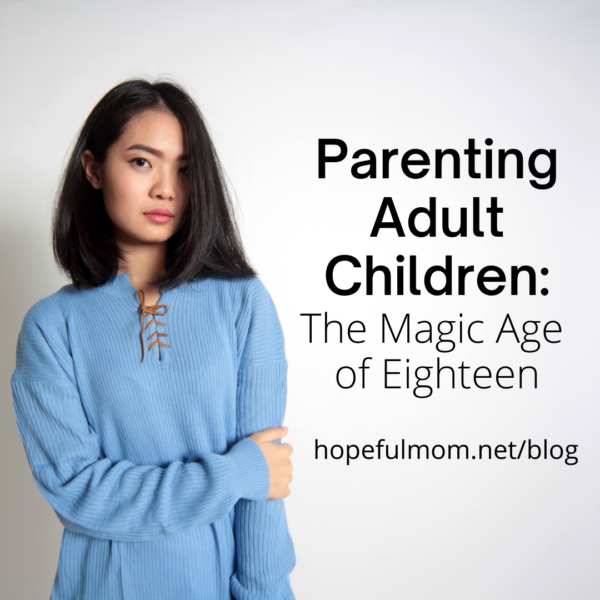What’s the trick to parenting adult children? Even after two of mine had left home, I still didn’t think I knew the secret.
The summer before my son left for college, I fretted about his wellbeing. Would he make friends? Would he flourish? Would he fail? Would his emotions plummet? Would he fall back into his pornography addiction? Or would he leave that old habit behind? And how involved should I be with his college life?
He’s now a senior, and I can confidently say that up to this point, I disengaged and meddled the appropriate amount. As far as I can tell, he’s on the right path and is ready to move on to his next stage of life. BONUS: We have a fabulous relationship.
When does our responsibility as parents end? Are we no longer obligated to support our children, monitor their activities, or help them when they turn eighteen? What if they turn their backs on us?
These are questions I’ve pondered recently as I’ve witnessed conversations on social media about filters, monitoring, and disciplining children as they approach and cross over that magic age of eighteen.
While our government declares eighteen as the point in time our children have reached adulthood, do we need to adhere to that standard within our homes? Do we completely cut the purse strings and kick them out on the streets? What if they’re still in high school? What if they disregard our rules and destroy our homes?
Incidentally, three states in the USA and several provinces in Canada set their age of majority as nineteen or twenty-one. And if you wonder, as I did, what age of majority means, Wikipedia defines it as “the threshold of adulthood as recognized or declared in law. It is the moment when minors cease to be considered such and assume legal control over their persons, actions, and decisions, thus terminating the control and legal responsibilities of their parents or guardian over them.”[i]
What about that special day makes us think our children no longer need us? That they can make it on their own? And why do you and I need to consider these questions? Well, because our children will one day turn eighteen, if they haven’t already, and we need to be prepared. We should determine our stance, our perspective, especially with children that have struggled with an ongoing issue like pornography.
Let’s face it. Children rarely pack their bags and hit the road on their eighteenth birthday. (If they do, it’s probably due to problems they are having or issues within the home.) So, we’re left discerning how to treat them after that date. Let’s not be taken by surprise. After all, we have eighteen years to get ready for that moment.
Children rarely pack their bags and hit the road on their eighteenth birthday. So how do we treat our adult children living in our home? #hopefulmom #adultchildren Share on XIn my opinion, parents should prepare their children for adulthood and living independent of adult supervision as they grow up. Contrary to some societal beliefs, they don’t leap from unequipped to equipped overnight.
In our home we gave our children more responsibility and authority as they matured. When they weren’t able to handle their obligations, if they faltered or misused their power, we pulled them back under our influence.
So, when should you stop telling your children what to do, quit monitoring their phone, and discontinue offering your advice? My answer: It depends. BUT it’s definitely not a hard stop on their eighteenth birthday.
Here are some factors to consider when choosing how to interact with your adult children:

- Brains aren’t fully developed until mid-twenties. Until then, the reasoning portion of the brain is still under construction; whereas, the fight or flight, emotional, give-it-to-me now portion is very active and making a lot of the decisions. Consider your child’s ability to make logical choices. When you see they’re able to grasp cause and effect well, pull back. If you’ve built a rapport with them and they know they can trust you, they will, hopefully, seek your advice when needed and come to you when their decisions don’t work out.
- Children mature at different paces. For this reason, treat each child differently.
- Family circumstances differ from home to home. Be sure to consult your child and consider their input. When deciding rules regarding screen time, monitoring, filtering, chores, etc. contemplate family dynamics, whether the child still lives at home, if the child struggles in a particular area like online gaming or pornography, and the type of relationship you have with the child. For example, our nineteen-year-old daughter still lives in our home. Because she understands the importance of uninterrupted sleep and accountability, she continues to put her phone in our master bathroom every night. When she is ready to move out, we will discuss different options regarding her phone at night. When our son is home from college on breaks, he keeps his phone in his room because that’s what he’s used to in his dorm. However, he doesn’t have any social media accounts because he finds them unnecessary in his life.
- Everyone needs accountability. In this digital age, filters on every Wi-Fi router and/or device are a necessity. In addition, we need friends and/or mentors to talk with. I’m healthier when I have someone I can reach out to who listens, helps me see my blind spots, makes suggestions, and offers me hope. Do your children have accountability partners? Trusted adults? Close friends who offer healthy solutions they confide in?
If you have an adult child in your home refusing to follow house rules or disrupting the rest of the family because of their behavior or lack of respect, pray about how to proceed. You might choose to offer options and, if your child still doesn’t abide by your rules, you may want to give them notice and ask them to leave.
I hope these suggestions and thoughts help you consider how to interact and/or intervene when your children approach and pass the age of majority. I enjoy spending time with my adult children. I’m super proud of who they have become and am grateful they still ask me questions about life and find my suggestions and advice important. That’s my hope for you, too.
Happy New Year! Please send me your thoughts and questions and remember to share this post. Subscribe for updates and a FREE PDF download. Thanks for traveling this journey with me.
[i] https://en.wikipedia.org/wiki/Age_of_majority
About the author
Barb Winters is the author of Sexpectations: Helping the Next Generation Navigate Healthy Relationships and founder of Hopeful Mom. She’s a certified mental health coach and offers one-on-one consultations for parents. For more about Barb, click "About" in the menu.




Parenting adult children is a process that continues to change as our children age. It doesn’t ever end but it does grow easier.
Yes! For some reason when my kiddos were babies I thought it was an eighteen-year endeavor. It was only after they were in their teens that I realized it was a lifelong adventure. Thanks for those words of wisdom and encouragement. 🙂
I am so glad I found your blog! Thank you for this wisdom.
Mary,
Thanks for commenting. I’m so grateful you found us!